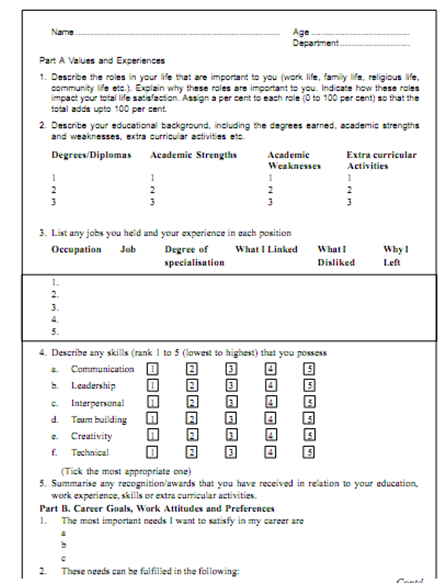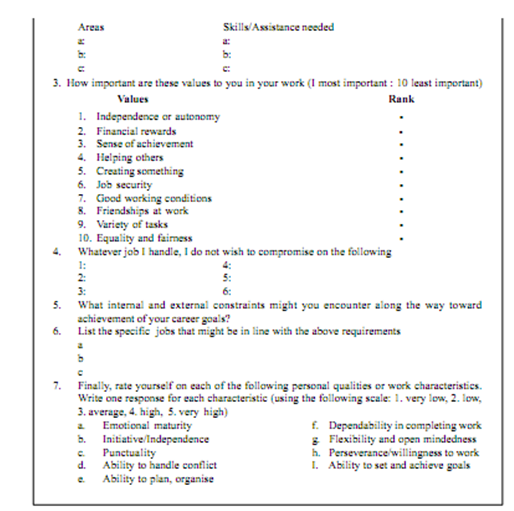Organisational Career Development
The assistance from managers & HR department is equally significant in attaining individual career objective and meeting organisational requirement. A variety of tools & activities are employed for this reason.


Individual counselling: worker counselling is a procedure whereby worker are guided in overcoming performance difficulty. Usually it is done through face- to-face meetings among the workers and the counsellor or coach. Here, discussions of workers interests, current job activities goals and performance and career goals take place. Generally Counselling is offered by the HR department. Occasionally outside experts are also being called in. If supervisors behave as coaches they should be given apparently defined roles and training. However this is a expensive and time consuming process.
Information services: Employment chance at various levels is made known to workers through information services of several kinds. Records of employees' skills, experience knowledge and performance show the possible candidates for filling such kind of vacancies. For compiling & communicating career-related information to workers, organisations basically use four methods:
Job posting system: Job posting systems are utilized by companies to inform workers regarding vacancies in the organisation through newsletters, notice boards, and other company publications.
Skills inventory: Skills inventories (containing employees' work histories, accomplishments, qualifications, geographical preferences, career objectives possible retirement dates, etc.) are formed to help organisations learn the description of their workforces so that they may use the skills of their workers, whenever necessary. Skills inventories also reveal shortage of decisive skills amongst employees, which is helpful in tracing training requirements.
Career ladders and career paths: Career paths & ladders throw light on career progression & future job chance in the organisation. They show a career plan complete with the objective, intermediate steps & time-tables for realising the objective. Career paths usually for fast-track workers are laid down in most of the organisations outlining a series of career moves that these workers have to initiate to reach higher level positions.
Career resource centre: In the organisation the career centre is a sort of library established to distribute career growth materials like, career manuals, reference books, brochures, newsletters and learning guides and self-study tapes.
Employee assessment programmes: Initially, a new recruit is informed regarding career policies & procedures of the company. Socialisation attempt help the recruit learn regarding these things rapidly. An experienced employee, acting like a coach can also help the new recruit form a realistic view of the skills essential at several levels and build up suitable career goals and action plans. Formal orientation programmes are utilized to educate worker on career paths, career programmes, and opportunity for advancement within the company.
Many assessment programmes are also utilized to evaluate the employees' potential for development and growth in the organisation. They involve assessment centre, promo ability forecasts, psychological testing and succession planning.
Assessment centres: Some performance simulation tests & exercises (interviews, tests in-baskets, business games) are utilized to rate a candidate's potential in appraisal centre method. On these exercises the performance is evaluated through a panel of raters & the participant is given feedback on their weaknesses and strengths. This feedback helps candidate to assess where they stand & what is to be done to scale up the corporate ladder in future.
Psychological tests: Diagnostic tests are utilized to help participant determine their vocational interests, work attitudes, personality kinds and other personal characteristics that can uncover their career requirements and preferences.
Promo ability forecasts: This is a procedure of identifying workers with high career potential and providing them essential training and thereby groom them for higher positions.
Succession planning: It is a report card indicating which individuals are prepared to move into greater positions in the company. The HR department have records of all of potential candidates who could move into senior positions, whenever needed.
Employee developmental programmes: These contain skill assessment & training attempt that organisations utilize to groom their worker for future vacancies. Workshops, Seminars job rotations & mentoring programmes are utilized to build up a broad base of skills as a part of such kind of developmental activities.
Career programmes for special groups: In current years, there is rising evidence regarding dual career families developing tensions & frictions owing to their incapability to reconcile the difference among family roles & work demands. While we talk of dual career couples (a state where both husband & wife have different careers outside the home) certain baffling questions arise naturally: Whose career is significant; who takes care of children; Who purchase groceries & cleans the house if both are busy, What if the wife gets a tempting promotion in another location; etc. Realising these difficulty, organisations are providing a place and a process for discussing such kind role conflicts & coping strategies. They are coming out with schemes like as part-time work, flexible working hours child care centres, long parental leave, and promotions and transfers in tune with the demands of dual career conflicts.Outplacement assistance is extended to workers who are laid off for several reasons. Additionally to asset workshops, outside experts are called in to indicate individuals how to target on their talents, build up resumes and interview with prospective workers. Special programmes are also prepared for minorities, workers with disabilities, women & late-career workers so that they may have apparent career objective & action plans in line with organisational needs.